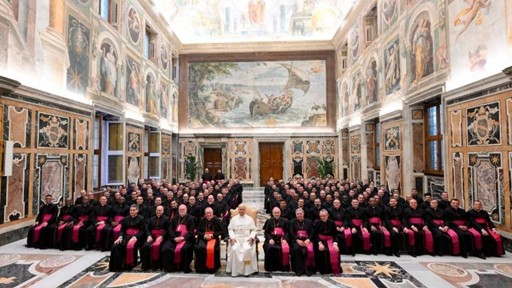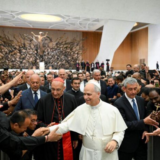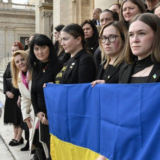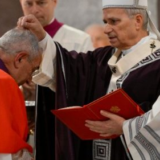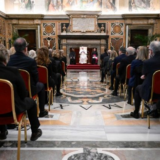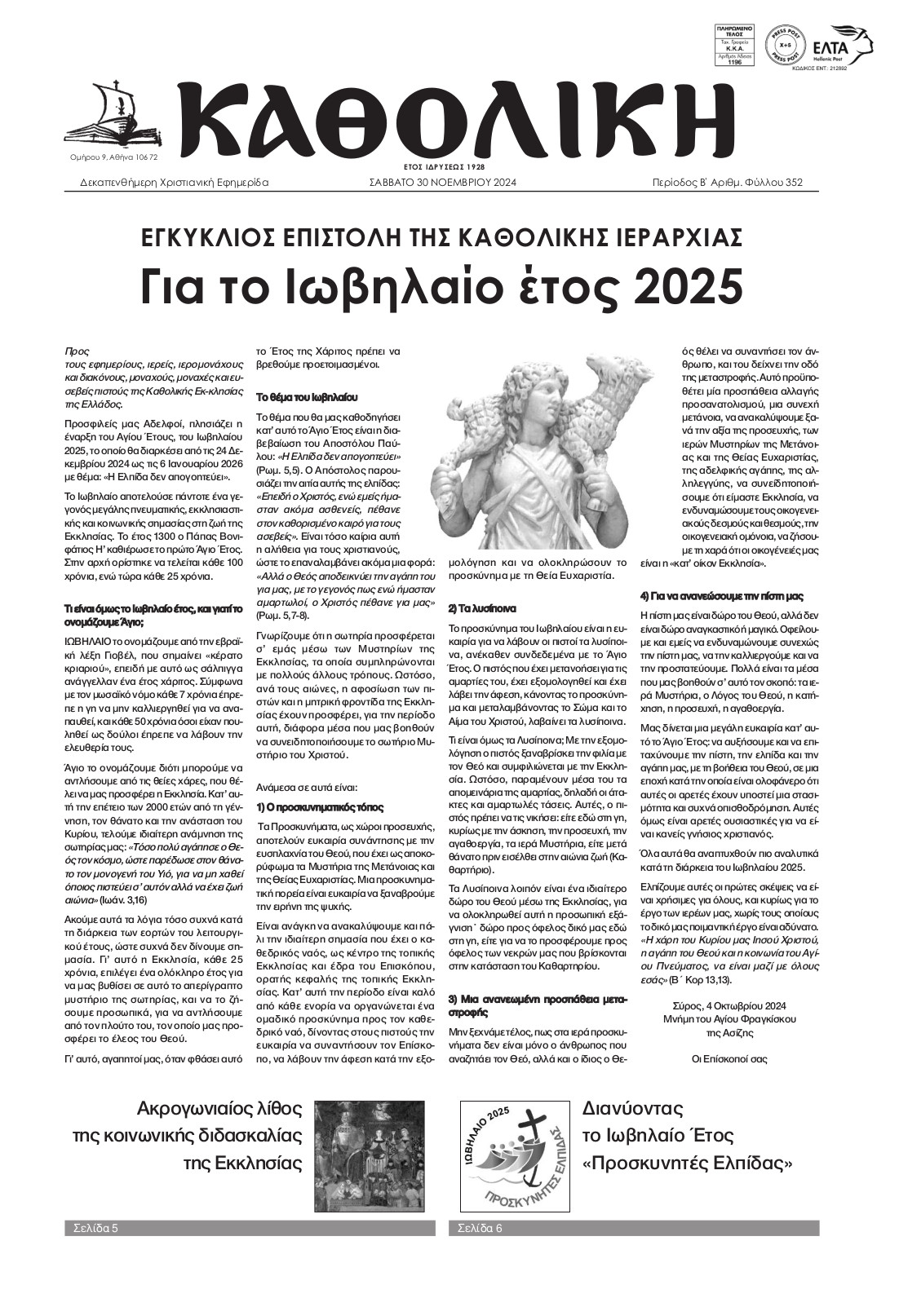
Η Κοινή Δήλωση του πάπα Φραγκίσκου και του Οικουμενικού Πατριάρχη Βαρθολομαίου στα Ελληνικά από την ιστοσελίδα του Οικουμενικού Πατριαρχείου ΕΔΩ
PILGRIMAGE TO THE HOLY LAND ON THE OCCASION OF THE 50th ANNIVERSARY
OF THE MEETING BETWEEN POPE PAUL VI AND PATRIARCH ATHENAGORAS IN JERUSALEM
(24-26 MAY 2014)
PRIVATE MEETING WITH THE ECUMENICAL PATRIARCH OF CONSTANTINOPLE
COMMON DECLARATION OF POPE FRANCIS
AND THE ECUMENICAL PATRIARCH BARTHOLOMEW I
Apostolic Delegation (Jerusalem)
Sunday, 25 May 2014
1. Like our venerable predecessors Pope Paul VI and Ecumenical Patriarch Athenagoras who met here in Jerusalem fifty years ago, we too, Pope Francis and Ecumenical Patriarch Bartholomew, were determined to meet in the Holy Land “where our common Redeemer, Christ our Lord, lived, taught, died, rose again, and ascended into Heaven, whence he sent the Holy Spirit on the infant Church” (Common communiqué of Pope Paul VI and Patriarch Athenagoras, published after their meeting of 6 January 1964). Our meeting, another encounter of the Bishops of the Churches of Rome and Constantinople founded respectively by the two Brothers the Apostles Peter and Andrew, is a source of profound spiritual joy for us. It presents a providential occasion to reflect on the depth and the authenticity of our existing bonds, themselves the fruit of a grace-filled journey on which the Lord has guided us since that blessed day of fifty years ago.
2. Our fraternal encounter today is a new and necessary step on the journey towards the unity to which only the Holy Spirit can lead us, that of communion in legitimate diversity. We call to mind with profound gratitude the steps that the Lord has already enabled us to undertake. The embrace exchanged between Pope Paul VI and Patriarch Athenagoras here in Jerusalem, after many centuries of silence, paved the way for a momentous gesture, the removal from the memory and from the midst of the Church of the acts of mutual excommunication in 1054. This was followed by an exchange of visits between the respective Sees of Rome and Constantinople, by regular correspondence and, later, by the decision announced by Pope John Paul II and Patriarch Dimitrios, of blessed memory both, to initiate a theological dialogue of truth between Catholics and Orthodox. Over these years, God, the source of all peace and love, has taught us to regard one another as members of the same Christian family, under one Lord and Saviour, Jesus Christ, and to love one another, so that we may confess our faith in the same Gospel of Christ, as received by the Apostles and expressed and transmitted to us by the Ecumenical Councils and the Church Fathers. While fully aware of not having reached the goal of full communion, today we confirm our commitment to continue walking together towards the unity for which Christ our Lord prayed to the Father so “that all may be one” (Jn 17:21).
3. Well aware that unity is manifested in love of God and love of neighbour, we look forward in eager anticipation to the day in which we will finally partake together in the Eucharistic banquet. As Christians, we are called to prepare to receive this gift of Eucharistic communion, according to the teaching of Saint Irenaeus of Lyon (Against Heresies, IV,18,5, PG 7,1028), through the confession of the one faith, persevering prayer, inner conversion, renewal of life and fraternal dialogue. By achieving this hoped for goal, we will manifest to the world the love of God by which we are recognized as true disciples of Jesus Christ (cf. Jn 13:35).
4. To this end, the theological dialogue undertaken by the Joint International Commission offers a fundamental contribution to the search for full communion among Catholics and Orthodox. Throughout the subsequent times of Popes John Paul II and Benedict the XVI, and Patriarch Dimitrios, the progress of our theological encounters has been substantial. Today we express heartfelt appreciation for the achievements to date, as well as for the current endeavours. This is no mere theoretical exercise, but an exercise in truth and love that demands an ever deeper knowledge of each other’s traditions in order to understand them and to learn from them. Thus we affirm once again that the theological dialogue does not seek a theological lowest common denominator on which to reach a compromise, but is rather about deepening one’s grasp of the whole truth that Christ has given to his Church, a truth that we never cease to understand better as we follow the Holy Spirit’s promptings. Hence, we affirm together that our faithfulness to the Lord demands fraternal encounter and true dialogue. Such a common pursuit does not lead us away from the truth; rather, through an exchange of gifts, through the guidance of the Holy Spirit, it will lead us into all truth (cf. Jn 16:13).
5. Yet even as we make this journey towards full communion we already have the duty to offer common witness to the love of God for all people by working together in the service of humanity, especially in defending the dignity of the human person at every stage of life and the sanctity of family based on marriage, in promoting peace and the common good, and in responding to the suffering that continues to afflict our world. We acknowledge that hunger, poverty, illiteracy, the inequitable distribution of resources must constantly be addressed. It is our duty to seek to build together a just and humane society in which no-one feels excluded or emarginated.
6. It is our profound conviction that the future of the human family depends also on how we safeguard – both prudently and compassionately, with justice and fairness – the gift of creation that our Creator has entrusted to us. Therefore, we acknowledge in repentance the wrongful mistreatment of our planet, which is tantamount to sin before the eyes of God. We reaffirm our responsibility and obligation to foster a sense of humility and moderation so that all may feel the need to respect creation and to safeguard it with care. Together, we pledge our commitment to raising awareness about the stewardship of creation; we appeal to all people of goodwill to consider ways of living less wastefully and more frugally, manifesting less greed and more generosity for the protection of God’s world and the benefit of His people.
7. There is likewise an urgent need for effective and committed cooperation of Christians in order to safeguard everywhere the right to express publicly one’s faith and to be treated fairly when promoting that which Christianity continues to offer to contemporary society and culture. In this regard, we invite all Christians to promote an authentic dialogue with Judaism, Islam and other religious traditions. Indifference and mutual ignorance can only lead to mistrust and unfortunately even conflict.
8. From this holy city of Jerusalem, we express our shared profound concern for the situation of Christians in the Middle East and for their right to remain full citizens of their homelands. In trust we turn to the almighty and merciful God in a prayer for peace in the Holy Land and in the Middle East in general. We especially pray for the Churches in Egypt, Syria, and Iraq, which have suffered most grievously due to recent events. We encourage all parties regardless of their religious convictions to continue to work for reconciliation and for the just recognition of peoples’ rights. We are persuaded that it is not arms, but dialogue, pardon and reconciliation that are the only possible means to achieve peace.
9. In an historical context marked by violence, indifference and egoism, many men and women today feel that they have lost their bearings. It is precisely through our common witness to the good news of the Gospel that we may be able to help the people of our time to rediscover the way that leads to truth, justice and peace. United in our intentions, and recalling the example, fifty years ago here in Jerusalem, of Pope Paul VI and Patriarch Athenagoras, we call upon all Christians, together with believers of every religious tradition and all people of good will, to recognize the urgency of the hour that compels us to seek the reconciliation and unity of the human family, while fully respecting legitimate differences, for the good of all humanity and of future generations.
10. In undertaking this shared pilgrimage to the site where our one same Lord Jesus Christ was crucified, buried and rose again, we humbly commend to the intercession of the Most Holy and Ever Virgin Mary our future steps on the path towards the fullness of unity, entrusting to God’s infinite love the entire human family. “ May the Lord let his face shine upon you, and be gracious to you! The Lord look upon you kindly and give you peace!” (Num 6:25-26).
Jerusalem, 25 May 2014
INCONTRO PRIVATO CON IL PATRIARCA ECUMENICO DI COSTANTINOPOLI
DICHIARAZIONE CONGIUNTA DEL SANTO PADRE FRANCESCO
E DEL PATRIARCA ECUMENICO PARTOLOMEO I
Delegazione Apostolica (Jerusalem)
Domenica, 25 maggio 2014
1. Come i nostri venerati predecessori, il Papa Paolo VI ed il Patriarca Ecumenico Athenagoras, si incontrarono qui a Gerusalemme cinquant’anni fa, così anche noi, Papa Francesco e Bartolomeo, Patriarca Ecumenico, abbiamo voluto incontrarci nella Terra Santa, “dove il nostro comune Redentore, Cristo Signore, è vissuto, ha insegnato, è morto, è risuscitato ed è asceso al cielo, da dove ha inviato lo Spirito Santo sulla Chiesa nascente” (Comunicato congiunto di Papa Paolo VI e del Patriarca Athenagoras, pubblicato dopo l’incontro del 6 gennaio 1964). Questo nostro incontro, un ulteriore ritrovo dei Vescovi delle Chiese di Roma e di Costantinopoli, fondate rispettivamente dai due fratelli Apostoli Pietro e Andrea, è per noi fonte di intensa gioia spirituale e ci offre l’opportunità di riflettere sulla profondità e sull’autenticità dei legami esistenti tra noi, frutto di un cammino pieno di grazia lungo il quale il Signore ci ha guidato, a partire da quel giorno benedetto di cinquant’anni fa.
2. Il nostro incontro fraterno di oggi è un nuovo, necessario passo sul cammino verso l’unità alla quale soltanto lo Spirito Santo può guidarci: quella della comunione nella legittima diversità. Ricordiamo con viva gratitudine i passi che il Signore ci ha già concesso di compiere. L’abbraccio scambiato tra Papa Paolo VI ed il Patriarca Athenagoras qui a Gerusalemme, dopo molti secoli di silenzio, preparò la strada ad un gesto di straordinaria valenza, la rimozione dalla memoria e dal mezzo della Chiesa delle sentenze di reciproca scomunica del 1054. Seguirono scambi di visite nelle rispettive sedi di Roma e di Costantinopoli, frequenti contatti epistolari e, successivamente, la decisone di Papa Giovanni Paolo II e del Patriarca Dimitrios, entrambi di venerata memoria, di avviare un dialogo teologico della verità tra Cattolici e Ortodossi. Lungo questi anni Dio, fonte di ogni pace e amore, ci ha insegnato a considerarci gli uni gli altri come membri della stessa famiglia cristiana, sotto un solo Signore e Salvatore, Cristo Gesù, e ad amarci gli uni gli altri, di modo che possiamo professare la nostra fede nello stesso Vangelo di Cristo, così come è stato ricevuto dagli Apostoli, espresso e trasmesso a noi dai Concili ecumenici e dai Padri della Chiesa. Pienamente consapevoli di non avere raggiunto l’obiettivo della piena comunione, oggi ribadiamo il nostro impegno a continuare a camminare insieme verso l’unità per la quale Cristo Signore ha pregato il Padre, “perché tutti siano una sola cosa” (Gv 17,21).
3. Ben consapevoli che tale unità si manifesta nell’amore di Dio e nell’amore del prossimo, aneliamo al giorno in cui finalmente parteciperemo insieme al banchetto eucaristico. Come cristiani, ci spetta il compito di prepararci a ricevere questo dono della comunione eucaristica, secondo l’insegnamento di Sant’Ireneo di Lione, attraverso la professione dell’unica fede, la preghiera costante, la conversione interiore, il rinnovamento di vita e il dialogo fraterno (Adversus haereses, IV,18,5. PG 7, 1028). Nel raggiungere questo obiettivo verso cui orientiamo le nostre speranze, manifesteremo davanti al mondo l’amore di Dio e, in tal modo, saremo riconosciuti come veri discepoli di Gesù Cristo (cf Gv 13,35).
4. A tal fine, un contributo fondamentale alla ricerca della piena comunione tra Cattolici ed Ortodossi è offerto dal dialogo teologico condotto dalla Commissione mista internazionale. Durante il tempo successivo dei Papi Giovanni Paolo II e Benedetto XVI e del Patriarca Dimitrios, il progresso realizzato dai nostri incontri teologici è stato sostanziale. Oggi vogliamo esprimere il nostro sentito apprezzamento per i risultati raggiunti, così come per gli sforzi che attualmente si stanno compiendo. Non si tratta di un mero esercizio teorico, ma di un esercizio nella verità e nella carità, che richiede una sempre più profonda conoscenza delle tradizioni gli uni degli altri, per comprenderle e per apprendere da esse. Per questo, affermiamo ancora una volta che il dialogo teologico non cerca un minimo comune denominatore teologico sul quale raggiungere un compromesso, ma si basa piuttosto sull'approfondimento della verità tutta intera, che Cristo ha donato alla sua Chiesa e che, mossi dallo Spirito Santo, non cessiamo mai di comprendere meglio. Affermiamo quindi insieme che la nostra fedeltà al Signore esige l’incontro fraterno ed il vero dialogo. Tale ricerca comune non ci allontana dalla verità, piuttosto, attraverso uno scambio di doni, ci condurrà, sotto la guida dello Spirito, a tutta la verità (cf Gv 16,13).
5. Pur essendo ancora in cammino verso la piena comunione, abbiamo sin d’ora il dovere di offrire una testimonianza comune all’amore di Dio verso tutti, collaborando nel servizio all’umanità, specialmente per quanto riguarda la difesa della dignità della persona umana in ogni fase della vita e della santità della famiglia basata sul matrimonio, la promozione della pace e del bene comune, la risposta alle miserie che continuano ad affliggere il nostro mondo. Riconosciamo che devono essere costantemente affrontati la fame, l’indigenza, l’analfabetismo, la non equa distribuzione dei beni. È nostro dovere sforzarci di costruire insieme una società giusta ed umana, nella quale nessuno si senta escluso o emarginato.
6. Siamo profondamente convinti che il futuro della famiglia umana dipende anche da come sapremo custodire, in modo saggio ed amorevole, con giustizia ed equità, il dono della creazione affidatoci da Dio. Riconosciamo dunque pentiti l’ingiusto sfruttamento del nostro pianeta, che costituisce un peccato davanti agli occhi di Dio. Ribadiamo la nostra responsabilità e il dovere di alimentare un senso di umiltà e moderazione, perché tutti sentano la necessità di rispettare la creazione e salvaguardarla con cura. Insieme, affermiamo il nostro impegno a risvegliare le coscienze nei confronti della custodia del creato; facciamo appello a tutti gli uomini e donne di buona volontà a cercare i modi in cui vivere con minore spreco e maggiore sobrietà, manifestando minore avidità e maggiore generosità per la protezione del mondo di Dio e per il bene del suo popolo.
7. Esiste altresì un urgente bisogno di cooperazione efficace e impegnata tra i cristiani, al fine di salvaguardare ovunque il diritto ad esprimere pubblicamente la propria fede e ad essere trattati con equità quando si intende promuovere il contributo che il Cristianesimo continua ad offrire alla società e alla cultura contemporanee. A questo proposito, esortiamo tutti i cristiani a promuovere un autentico dialogo con l’Ebraismo, con l’Islam e con le altre tradizioni religiose. L’indifferenza e la reciproca ignoranza possono soltanto condurre alla diffidenza e, purtroppo, persino al conflitto.
8. Da questa Città Santa di Gerusalemme, vogliamo esprimere la nostra comune profonda preoccupazione per la situazione dei cristiani in Medio Oriente e per il loro diritto a rimanere cittadini a pieno titolo delle loro patrie. Rivolgiamo fiduciosi la nostra preghiera al Dio onnipotente e misericordioso per la pace in Terra Santa e in tutto il Medio Oriente. Preghiamo specialmente per le Chiese in Egitto, in Siria e in Iraq, che hanno sofferto molto duramente a causa di eventi recenti. Incoraggiamo tutte le parti, indipendentemente dalle loro convinzioni religiose, a continuare a lavorare per la riconciliazione e per il giusto riconoscimento dei diritti dei popoli. Siamo profondamente convinti che non le armi, ma il dialogo, il perdono e la riconciliazione sono gli unici strumenti possibili per conseguire la pace.
9. In un contesto storico segnato da violenza, indifferenza ed egoismo, tanti uomini e donne si sentono oggi smarriti. È proprio con la testimonianza comune della lieta notizia del Vangelo, che potremo aiutare l'uomo del nostro tempo a ritrovare la strada che lo conduce alla verità, alla giustizia e alla pace. In unione di intenti, e ricordando l’esempio offerto cinquant’anni fa qui a Gerusalemme da PapaPaolo VI e dal Patriarca Athenagoras, facciamo appello ai cristiani, ai credenti di ogni tradizione religiosa e a tutti gli uomini di buona volontà, a riconoscere l’urgenza dell’ora presente, che ci chiama a cercare la riconciliazione e l’unità della famiglia umana, nel pieno rispetto delle legittime differenze, per il bene dell’umanità intera e delle generazioni future.
8. Mentre viviamo questo comune pellegrinaggio al luogo dove il nostro unico e medesimo Signore Gesù Cristo è stato crocifisso, è stato sepolto ed è risorto, affidiamo umilmente all’intercessione di Maria Santissima e Sempre Vergine i passi futuri del nostro cammino verso la piena unità e raccomandiamo all’amore infinito di Dio l’intera famiglia umana.
“Il Signore faccia risplendere per te il suo volto e ti faccia grazia. Il Signore rivolga a te il suo volto e ti conceda pace” (Nm 6, 25-26).
Gerusalemme, 25 maggio 2014
|
FRANCESCO |
BARTOLOMEO I |
